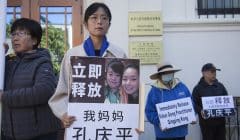2005 Opinion by the Working Group on Arbitrary Detention determining that Falun Gong practitioner Ms. Qiu Minghua had been arbitrarily detained
OPINION No. 32/2005 (CHINA) Communication addressed to the Government on 20 December 2004.
Concerning Ms. Qiu Minghua, The State has signed but not yet ratified the International Covenant on Civil and Political Rights.
1. (Same text as paragraph 1 of opinion No. 20/2004.)
2. The Working Group conveys its appreciation to the Government for having forwarded the requisite information in good time.
3. (Same text as paragraph 3 of opinion No. 20/2004.)
4. The Working Group welcomes the cooperation of the Government, which provided it with comments on the allegations put forward in the communication. The source, to which those comments were transmitted, made observations on them. The Working Group believes that it is in a position to render an opinion on the facts and circumstances of the case, in the context of the allegations made.
5. According to the communication, Ms. Qiu Minghua, citizen of China, is living in Wu Zhong District, Suzhou, Jiangsu Province. On 25 November 2004, at about 1 p.m., officers of the Suzhou police station entered the apartment of Ms. Qiu and her husband. Ms. Qiu was away from home at the time. In the presence of Ms. Qiu’s husband, they searched the apartment until approximately 5 p.m. and seized several items, among them a computer, a printer, toner cartridges, mobile phones, telephone directories and an address book. Between 2 p.m. and 3 p.m. of the same day Ms. Qiu returned to the apartment. The police detained Ms. Qiu and took her to Detention House No. 1 of the Suzhou Public Security Bureau, located in Lumuzhen, Xiangcheng District of Suzhou, where she remains in detention. Police authorities informed Ms. Qiu that her detention was in connection with her affiliation with Falun Gong. However, they did not present an arrest warrant, detention order, or any other written document justifying the detention.
The source alleges that the detention of Ms. Qiu is arbitrary because it is devoid of a legal basis. She did not receive a written order for her detention. She cannot contact legal counsel, and consequently she cannot challenge the lawfulness of her detention. It was also said that the repression of Falun Gong is so harsh that no one dares to assist Ms. Qiu.
7. The source argues that Ms. Qiu’s detention results from the exercise of her right to freedom of thought, conscience and religion, protected by article 18 of the Universal Declaration of Human Rights, and of her right to freedom of expression, protected by article 19.
[…]
9. It appears from the Government’s reply that Ms. Qiu was in fact arrested in November 2004 and that she was still in detention on 12 May 2005 (date of the Government’s reply). It is also clear from the statement made by the Government that the legal ground on which Ms. Qiu’s deprivation of liberty is based is the criminal law. Yet not even the Government contests that no warrant was shown to her upon arrest, and that she has been and is being prevented from contacting a defence lawyer. The position of the Working Group is that in the context of the circumstances of the case, these procedural flaws are of such gravity as to give an arbitrary character to the deprivation of Ms. Qiu’s liberty.
10. The Government’s information is unambiguous in that Ms. Qiu is being proceeded
against because of her affiliation with Falun Gong. Referring to the allegation of the source that Ms. Qiu is being persecuted because of her religious convictions, the Government argues that Falun Gong is not a religion, but rather an anti-social and anti-scientific sect.
11. International law ensures to everyone the right to freedom of thought, conscience or eligion (Universal Declaration of Human Rights, art. 18). Therefore, to render an opinion in this case, the Working Group is not called upon to take a position on whether Falun Gong is a religion, a religious denomination, a sect, or a belief. Freedom of religion or belief itself cannot be subjected to any restriction; only the manifestation of that freedom can be limited by law, to the extent strictly necessary to protect public safety, order, health or morals, or the fundamental rights and freedom of others. Any restriction shall, however, be justified by a reasoned presentation of the grounds and the cause of that restriction. In the case under review, the Government failed to adduce any argument explaining why and how Ms. Qiu’s affiliation with, or profession of, the ideas or principles of Falun Gong was or could have been detrimental to the society as a whole, or to other individuals. A general reference to the dangers of practicing Falun Gong did not convince the Working Group that in the context of this particular case the deprivation of liberty imposed on Ms. Qiu is necessary and, if so, is proportionate to the aim pursued.
2. In the light of the foregoing, the Working Group renders the following opinion:
The deprivation of liberty of Ms. Qiu Minghua is arbitrary, being in contravention of article 9 and article 18 of the Universal Declaration of Human Rights, and falls under categories II and III of the categories applicable to the consideration of the cases submitted to the Working Group.
3. Consequent upon the opinion rendered, the Working Group requests the Government to take the necessary steps to remedy the situation of Ms. Qiu.
Adopted on 2 September 2005
E/CN.4/2006/7/Add.1 (pg 85-87)
For the full text of the opinion, see: http://www1.umn.edu/humanrts/wgad/32-2005.html






